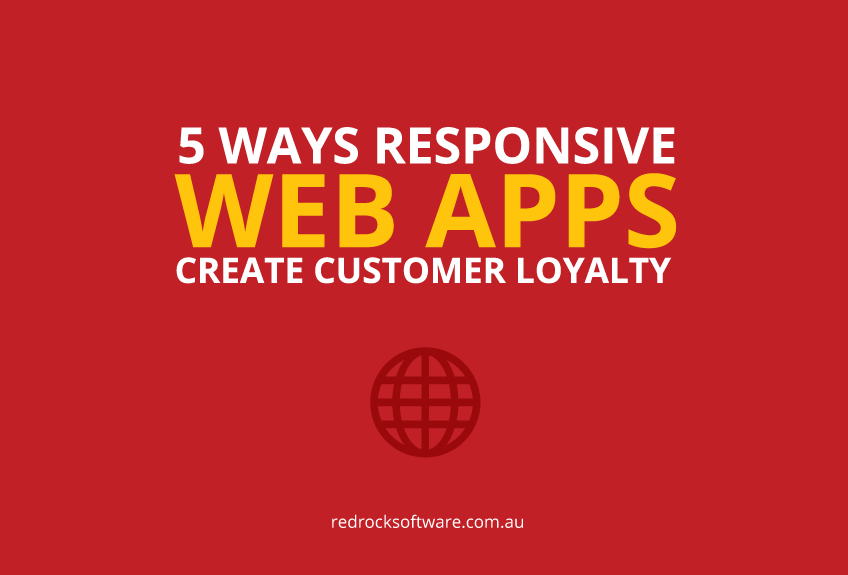
12 Jul 5 Ways Responsive Web Apps Create Customer Loyalty
The first thing we need to figure out is what exactly is responsive web design? If you’ve heard the term before, but aren’t quite sure what it is, let us put your fears aside and explain how simple it is. In fact, it’s a concept that you are probably already familiar with,- whether you realised it or not.
Responsive Web In A Nutshell
Essentially, if a website or web app is responsive, it will adapt to whatever screen size it’s viewed from. It’s as simple as that. Ideally, you shouldn’t even realise that the website has changed. When iPads and smartphones first came out, responsive web design was definitely not a thing; you were an early adopter, you probably remember having to pinch and zoom in and out until you could get the website right.This still happens, but luckily, to a much lesser degree.Eventually, many companies finally switched to having both a mobile and desktop version of their website. A mobile version isn’t responsive, though, as it’s just a smaller version of a regular website displayed at a fixed lower resolution.Having two different versions of a website isn’t enough anymore. Not only does it make integration more complicated, there are much more than only two screens sizes to take into account. In fact, according to Mobify, no one screen size has more than 20% market share.So if you have two different sites with two different resolutions…that’s a maximum of only 40% market share.Herewith lies the true power of web apps and responsive web design. The best part about a responsive site is that it is the same fully functional website that is viewed from a desktop, only without the fixed resolution.It doesn’t matter what size the screen is; a projector on the wall, a laptop, a smartphone, a tablet. They all access the same website, one specially designed to appear legible and easily accessible to any size screen. On the other hand, if a customer can’t navigate your website on their device, you will have a hard time convincing them to returnClearly, you don’t want that. Here’s how responsive web apps can make your customers stay with you for the long haul:
Better SEO
Website s optimised for different screens sizes, especially mobile, will get much higher in Google’s search rankings. When it comes to the perpetual SEO struggles, you will find few easier ways to boost your site’s impact than making sure your it is optimised for different screens.If your competition has responsive web pages and your company doesn’t, that leaves you behind in the marketing race.To provide you with further proof, Mobify states in the same study
“a full 57 percent of mobile users will abandon your website if it takes more than 3 seconds to load and 30 percent will abandon a purchase transaction if the shopping cart isn’t optimized for mobile devices.”
More people use mobile
A global study from MarketingLand found that people who go online “mostly via desktop” make up for a paltry 11%. The largest percentage of people questioned, a substantial 37%, go online mostly using mobile. The survey was rounded out with 28% of individuals claiming to use both equally, and 23% only using mobile.Take note that it’s not just websites, either. In fact, the vast majority of time people spend online with their mobile devices is in apps.
Installed apps are loyalty
It’s one thing to go to a website that you fond off Google, and another to install a program, That’s because installing anything implies a much bigger commitment. App stores have somewhat bridged this gap by making the app installing process as easy as visiting a website.However, the commitment it takes to get an app is the very reason why people use them to their full potential: a staggering 89% of consumer media time is spent in mobile apps as opposed to 11% that is spent in mobile web, claims SmartInsights.Why is that? Firstly, the app is designed for a specific platform. People assume it will work better than the mobile version of the website. Another major reason is loyalty. If a person finds a product or a program they like and frequently use, they will want to use it even more often.
Apps make people make decisions
According to Convince and Convert, 70% of mobile searches lead to online action within an hour, which is 3 times higher than the same search done on a desktop or a laptop! This figure may seem shocking, but on second thoughts, it does make sense: smartphone users searching for products and services are more likely on the go, in a hurry, and prone to hasty decisions.Not to mention they also tend to have a general idea of what they want.
Get pushy
Not literally, of course. Apps give you other benefits that websites do not, like push notifications. Most consumers can’t tell the difference between a web app and a mobile app once they have been installed.Push notifications are the difference. With the app user’s permission, you can send reminders and notifications to not only help your sales, but to make sure your customer relationship stays strong.Thanks to responsive web design, you can literally be in the pocket of your customer at all times -and the best part is, they are the one downloading the app, so that means they actually want your business. If that doesn’t mean loyalty, we don’t know what does.


